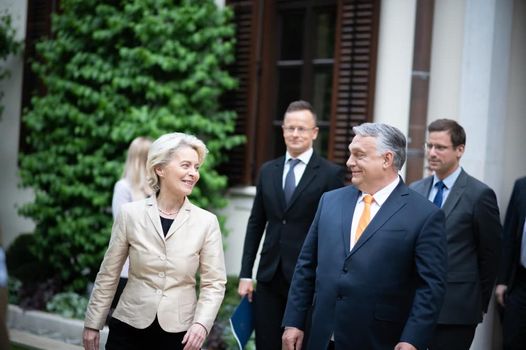
Following the announcement of the Hungarian veto on the sixth set of sanctions against Russia, Commission President Ursula von der Leyen made a short trip to Budapest on Monday, May 9th to speak directly with Hungarian Prime Minister Viktor Orbán. The baton was then passed to French President Emmanuel Macron, who spoke to Orbán by phone on Tuesday, May 10th.
Hungarian Foreign and Trade Minister Péter Szijjártó had justified Hungary’s hostility to the new sanctions by explaining that they would undermine Hungary’s “energy security,” and that his country could not therefore agree to them. Viktor Orbán clarified things on the radio on Friday, May 6th: “I said yes to the first five packages of sanctions, but we made it clear from the start that there was a red line: the energy embargo. They have crossed that line … there is a moment when you have to say stop.”
Hungary is not the only one to express its reservations about these sanctions. Bulgaria, Slovakia, and the Czech Republic have asked for an adjustment in terms of deadlines, as these three countries are extremely dependent on Russian oil.
The discussion between Ursula von der Leyen and Viktor Orbán lasted throughout Monday afternoon and continued into the evening. At the end of the discussion, the Commission President commented on Twitter on the progress made and the efforts still to be made to overcome all the difficulties:
This evening’s discussion with PM Viktor Orban was helpful to clarify issues related to sanctions and energy security.
— Ursula von der Leyen (@vonderleyen) May 9, 2022
We made progress, but further work is needed. I will convene a VC with regional players to strengthen regional cooperation on oil infrastructure.
Discussions must continue with Hungary, but also at regional level with other countries concerned by the consequences of the application of these sanctions.
The Hungarian Foreign Minister was keen to keep up the pressure on the European authorities, pointing out that adopting the sanctions as they stand would be tantamount to dropping “a nuclear bomb on the Hungarian economy.” For her part, Ursula von der Leyen also sent a very clear signal to reluctant nations by mentioning the possible end of the unanimity rule which currently allows a single state to have a veto right on a certain number of decisions taken at European level.
Hungarian social networks supporting Prime Minister Orbán’s position reacted with humorous images of Ursula von der Leyen filling up her car with petrol in Hungary to take advantage of the advantageous rates, while in Germany there are increasing calls to save on hot water, heating, and petrol to cushion the impact of the sanctions on Russia.
The proposal submitted by Brussels to the EU-27 provided for a halt to Russian crude oil imports within six months and to refined products by the end of 2022. A one-year derogation until the end of 2023 was foreseen for Hungary and Slovakia, but this was deemed insufficient. It was extended to the end of 2024 in a new draft discussed on Friday. The Czech Republic has also been granted an extension. Budapest is pushing for a five-year deadline. To secure its alternative oil supply, Hungary would need a new pipeline linking it to Croatia, which has access to the sea. In order to do so, it requires guarantees on Zagreb’s commitment to build this infrastructure and on European funding to complete the project.
